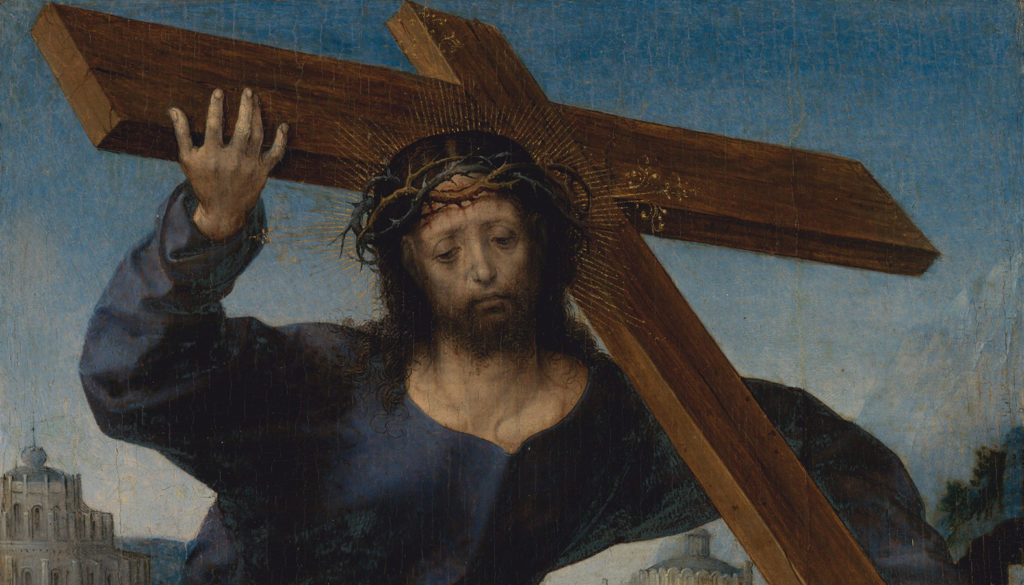One recent morning I found myself in downtown LA hanging out in front of the Superior Courthouse’s Grand Avenue entrance.
I was sipping a Starbucks, idly thinking, watching the parade of humanity pass by. Kids hefting backpacks, fashionistas with crossbody bags, young guys on bikes, languidly weaving in and out of pedestrian traffic with plastic bags dangling from the handlebars.
Lawyers schlepping briefcases, couriers humping banker’s boxes of files, mothers-to-be carrying babies in their wombs, fathers carrying babies in the crooks of their arms.
Homeless people pushing impossibly heavy carts. Everybody carrying a phone.
I myself had a purse as well as a tote bag with snacks, water, and a book.
Everybody, in other words, was carrying something. Incarnate beings that we are, from the time we’re born practically till the day we die, we’re carrying loads of some sort. At first rattles, dolls, toy trains. Later, the groceries, the laundry, tool kits.
Our breviaries, our missalettes, our rosaries, our prayer cards. The ushers carry the offertory, the altar server carries the water and wine, the priest lifts the chalice.
Even the Russian stranniks — wandering pilgrims endlessly reciting the Jesus Prayer — carried a hunk of black bread, some salt, and a copy of the Gospels.
The Fourth Sorrowful Mystery of the Rosary is The Carrying of the Cross. In his book “The Rosary of Our Lady,” theologian Romano Guardini observes:
“In the last analysis everything is a ‘burden,’ not because it is painful instead of joyous, but because sin has stamped it with the curse of hardship. Man seeks to escape it. He will not take it upon his shoulders and persevere beneath it. Indolence, cowardice, resistance against the hardships of life, all mean here for Christ the obligation to carry a weight that is beyond His strength.”
Our body is our first cross and the one we carry all our lives. In youth, we suffer its lust, hunger, and ambition. In old age, we begin to collapse beneath its weight, its aches and pains, the psychic suffering carried for decades in our nervous systems, our minds, our hearts.
That we are going to age (if we live that long) and die is our biggest cross.
The carrying of the cross put Christ in eternal solidarity not only with all of humanity but, though he died at 33, with the aging, the old, the dying. Like an elderly person, he was debilitated and diminished. He could no longer carry the load by himself. He had to accept help.
“Truly, truly, I say to you,” he had already told Peter, “when you were young, you used to dress yourself and walk wherever you wanted, but when you are old, you will stretch out your hands, and another will dress you and carry you where you do not want to go” (John 21:18).
The Apostles’ Creed we pray at the beginning of every rosary ends, “I believe in the Holy Spirit, the holy catholic Church, the communion of saints, the forgiveness of sins, the resurrection of the body, and life everlasting.”
The resurrection of the body. This body that has carried us all our lives, that is our joy and our torment, that we are with 24/7 and still don’t understand or know, to which we are nailed as surely as Christ is nailed to the cross.
But as with Christ, the instrument of our torture and death will also be the instrument of our redemption.
As we age and mature in faith, for example, perhaps we’re freed from some of our psychic and spiritual burdens. Perhaps we then devote our lives to atoning for the sins of the world — ours, always, but the sins of others as well: those we love; those we’ll never meet; those who have no one to pray for them, and never will.
The “Pange lingua,” a medieval Latin hymn written by St. Thomas Aquinas, runs:
Sweet the wood
Sweet the nails
Sweet the weight they bear.
Do we carry our bodies, or do our bodies carry us?
Did Christ carry the cross, or did the cross carry him?
Anna Kamienska (1920-1986), a more contemporary poet beloved in her native Poland, lived through both the Nazi and Communist eras.
In “Those Who Carry,” she writes of the men and women of the streets of Warsaw — but she could just as well be speaking of the young mothers, the guys bringing takeout to their grannies, the homeless of downtown LA.
As we ache for Easter morning, she could just as well be speaking of all of us.
Those who carry grand pianos
to the tenth floor wardrobes and coffins
the old man with a bundle of wood hobbling toward the horizon
the lady with a hump of nettles
the madwoman pushing her baby carriage
full of empty vodka bottles
they all will be raised up
like a seagull’s feather like a dry leaf
like an eggshell a scrap of newspaper on the street
Blessed are those who carry
for they will be raised.

